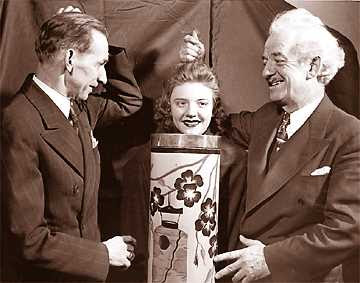In Lauren Weiner’s New Atlantis article about Ray Bradbury, she provides a tidy description of the Space Age sage’s youthful education:
“Bradbury spent his childhood goosing his imagination with the outlandish. Whenever mundane Waukegan was visited by the strange or the offbeat, young Ray was on hand. The vaudevillian magician Harry Blackstone came through the industrial port on Lake Michigan’s shore in the late 1920s. Seeing Blackstone’s show over and over again marked Bradbury deeply, as did going to carnivals and circuses, and watching Hollywood’s earliest horror offerings like Dracula and The Phantom of the Opera. He read heavily in Charles Dickens, George Bernard Shaw, Edgar Allan Poe, H. G. Wells, Arthur Conan Doyle, L. Frank Baum, and Edgar Rice Burroughs; the latter’s inspirational and romantic children’s adventure tales earned him Bradbury’s hyperbolic designation as ‘probably the most influential writer in the entire history of the world.’
Then there was the contagious enthusiasm of Bradbury’s bohemian, artistic aunt and his grandfather, Samuel, who ran a boardinghouse in Waukegan and instilled in Bradbury a kind of wonder at modern life. He recounted: ‘When I was two years old I sat on his knee and he had me tickle a crystal with a feathery needle and I heard music from thousands of miles away. I was right then and there introduced to the birth of radio.’
His family’s temporary stay in Arizona in the mid-1920s and permanent relocation to Los Angeles in the 1930s brought Bradbury to the desert places that he would later reimagine as Mars. As a high-schooler he buzzed around movie and radio stars asking for autographs, briefly considered becoming an actor, and wrote and edited science fiction ‘fanzines’ just as tales of robots and rocket ships were gaining in popularity in wartime America. He befriended the staffs of bicoastal pulp magazines like Weird Tales,Thrilling Wonder Stories, Dime Mystery, and Captain Future by bombarding them with submissions, and, when those were rejected, with letters to the editor. This precocity was typical. Science fiction and ‘fantasy’ — a catchall term for tales of the supernatural that have few or no fancy machines in them — drew adolescent talent like no other sector of American publishing. Isaac Asimov was in his late teens when he began writing for genre publications; Ursula K. Le Guin claimed to have sent in stories from the age of eleven.”
••••••••••
Harry Blackstone, Sr. with his classic bit, “The Bunny Trick”:

